Education
Education
Get started early and keep going


Tokyo Tech is focused on enhancing students' English proficiency and communication skills in addition to their expertise in science and engineering.
There are no shortcuts to improving English proficiency. It is important to start as soon as possible and keep going. Tokyo Tech provides a rich palette of options that allows you to combine classes, self-study, exams, and study abroad, all according to your level.
Above all, in the Global Scientists and Engineers Course (GSEC), you can systematically study programs that enhance your global competence. Here, three graduates of GSEC shared their efforts how they improved their English proficiency and communication skills.
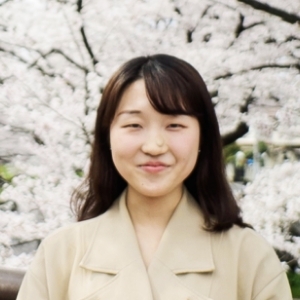
Mei Fukuda
Works at Google Japan G.K.
March 2022: Completed the master's degree program at the Department of Mathematical and Computing Science, School of Computing, Tokyo Tech
2021 academic year: GSEC Advanced Completion
It was a two-week homestay in Australia in the third year of junior high school that made me want to acquire proficiency in English. I didn't have the opportunity to go abroad when I was in high school, so I definitely wanted to study abroad and learn to speak English during university. Immediately after I entered Tokyo Tech, I joined GSEC.
At the end of the first year of my bachelor's degree program, I participated in the "Short-term Study Abroad Program in Singapore and Malaysia" of GSEC in March 2017 and the "Short-term Study Abroad Program in India" in August of the same year. My purpose for participating in the program was to improve my English proficiency while learning about the local culture. Also, since my major was computer science, I wanted to see the environment of the rapidly developing IT industry in India.
As I continued to take electives in English and study through e-learning, my scores increased and I became more confident. So, in August of 2018, the third year of my bachelor's degree program, I traveled to the United States for 24 days as a member of a student group called EPATS. Students arranged all of their appointments on their own and visited the computer science laboratories of top universities and cutting-edge computer companies, which cultivated independence and gave me confidence.
In February 2019, I studied abroad at Rice University in the United States for a month. This was a program for female students in a bachelor's degree program in STEM in Japan. I belonged to a laboratory at Rice University as an intern and did research there. I also did poster presentations in English. I have rarely had the opportunity to speak about my research in English, so it was a good step forward for me.
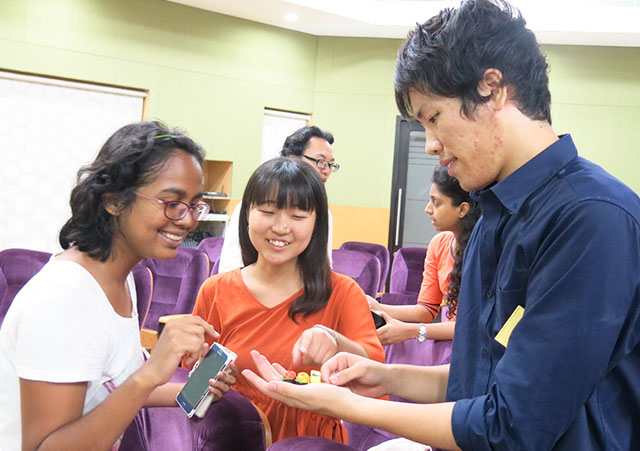
Exchange with Indian Institute of Technology Madras students (Short-term study abroad in India)
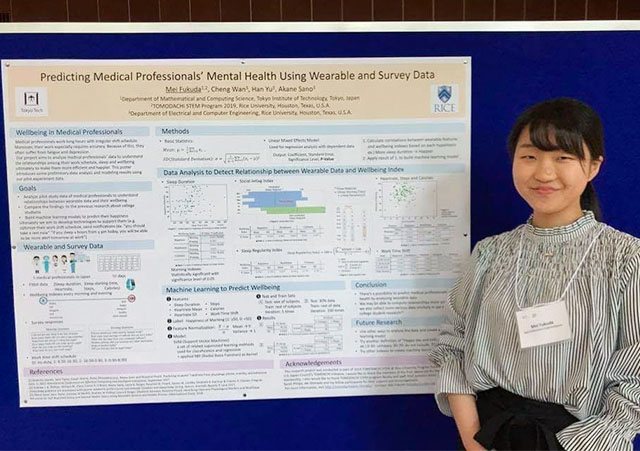
TOMODACHI STEM research intern poster presentation at Rice University
The subjects I took in GSEC such as "Oral Expression in English" and "Academic Presentation" proved very useful over the course of these study-abroad programs. Without experience giving presentations in English I would have been lost, but I was saved by class exercises through which I had become accustomed to it.
Furthermore, in September 2019 I continued on to a master's degree program at Tokyo Tech, and in December 2021 I arranged an appointment with a professor to do research abroad at the State University of New York at Binghamton for two months. I thought about my research theme and wrote a research paper. In the first half of the bachelor's degree program, the main purpose of studying abroad was to experience the local culture and improve my English proficiency, but by the time I was studying in a master's degree program, the purpose had changed to studying my specialization in English.
I also had internships at Google Japan in September of 2019, the fourth year of my bachelor's degree program, and in October of 2020, the first year of my master's degree program. Since the official company language is English, I was able to make use of my experience studying English and studying abroad. Since April 2022, I have been working as a software engineer at Google Japan, off the back of this internship. The diverse range of colleagues and global environment make Google Japan an attractive place to work.
It is important to create motivation on your own to keep studying English. I was motivated by the prospect of making friends with many international students on campus through club activities and Tokyo Tech International Students Association (TISA) activities, and being able to speak more English with them. Studying abroad made me realize that I didn't want lacking English proficiency to narrow my future options, which pushed me to keep studying English. Therefore, I think actively finding things you could enjoy only if you learned English and other things to look forward to are key to improving your English.
Tokyo Tech offers English courses aiming to enable students to obtain a TOEFL iBT of 80 or higher, a TOEFL ITP of 550 or higher, or a TOEIC of 750 or higher, which corresponds to one of the completion requirements for the GSEC intermediate level.
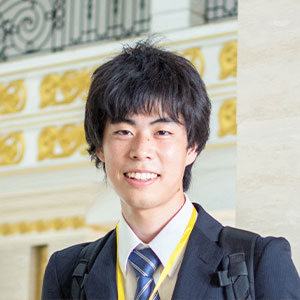
Tomoki Furuhashi
Second-year doctoral student at the School of Physical and Mathematical Sciences, College of Science, Nanyang Technological University (Singapore)
March 2020: Completed a master's degree program at the Department of Chemical Science and Engineering, School of Materials and Chemical Technology, Tokyo Tech
2017 academic year: GSEC Intermediate Completion
I first wanted to acquire English proficiency in my second year of high school when I went to Malaysia and the United States for an "International Training Program." I enrolled at Tokyo Tech in 2014, and immediately joined GSEC. There, I took a class with group work (Introductory Course for Global Scientists and Engineers) in English with international student TAs (teaching assistants) about issues in developing countries, and acquired basic English communication skills. I also focused on studying TOEIC because I wanted to improve my reading skills.
On the other hand, in my high school international training program I felt that I couldn't acquire day-to-day English just through classroom lectures, so I joined the "International Development Academy (IDA)". IDA is an official club of Tokyo Tech, which promotes various projects with the purpose of using science and engineering knowledge to contribute to the world through technology. When I was in the first year of my bachelor's degree program, I participated in a "compost project" to prevent water pollution caused by toilets (a problem in developing countries), and visited the Philippines.
After returning to Japan, I took many electives such as an "English Presentation Seminar." At first, the teachers spoke so quickly that I couldn't follow what they were saying. But I met a teacher whom I admire very much and retook his courses until I was able to understand naturally spoken English. Furthermore, I began to see that English is just a means of communication and a tool to convey what I want to convey. Removing the psychological barrier to English was a big gain for me.
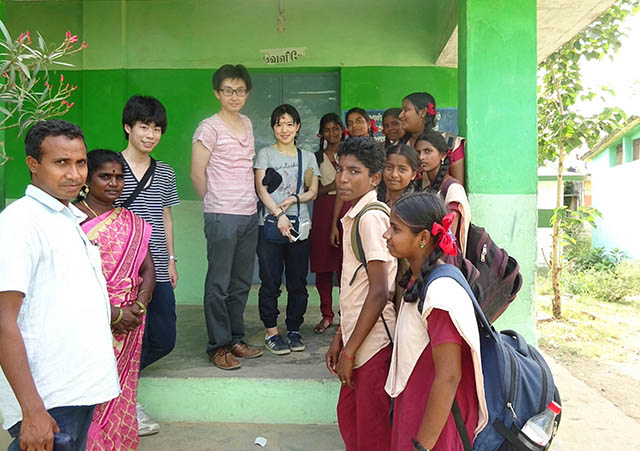
Village survey in India (ToiTech)
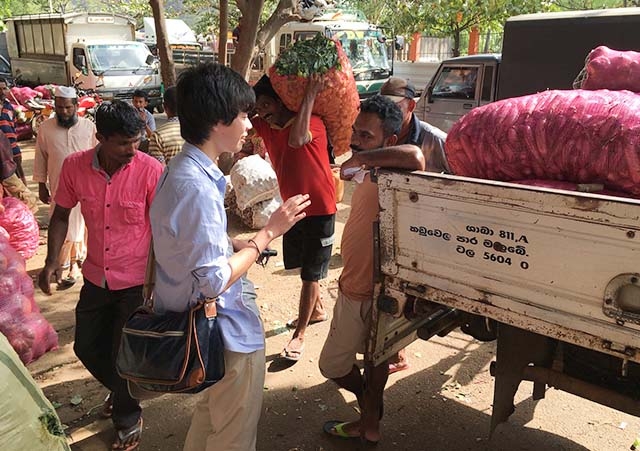
Interaction with local merchants (short-term study abroad in Sri Lanka)
In the third year of my bachelor's degree program, I participated in a Short-term Study Abroad Program in Sri Lanka. There, I learned that cinnamon is difficult to process, so young people abandoning agriculture resulting in a reduced number of craftsmen has become an issue. When I was in the fourth year of my bachelor's degree program, I launched a "Cinnamon Project in Sri Lanka" at the IDA to make a tool that can easily process cinnamon. This project made me realize the importance of English.
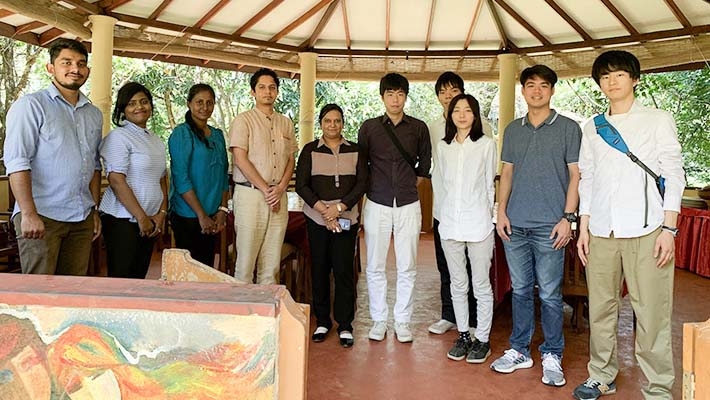
Exchanging opinions with university professors in Sri Lanka (IDA Cinnamon Project)
The master's degree program featured active exchange with international students from various countries through the IDA and exchange programs. By putting myself in an environment where I had to use English, I honed my English skills. Also, because I was in a laboratory that accepted many international students, I sometimes had discussions about research in English. However, I didn't have the same level of English as a native speaker, so I couldn't follow English in all situations such as during lectures, daily conversations, and presentations. I often felt isolated, which made me frustrated.
However, when I entered a doctoral program at Nanyang Technological University in Singapore in August 2020, my thinking about English proficiency changed. I often heard that if you get used to listening to English, you will be able to understand it, and I realized that you can really learn to follow English just like that. Eventually, it became easy for me to ask people to repeat themselves because I thought it was just a matter of getting used to their speech.
There are three things I would like to convey. The first is that it is important to persevere with English. Second, English conversation does not have to be in correct English. And finally, have a strong desire to convey your thoughts to the other person and to learn the other person's thoughts. I think that communication is always possible if the desire is there.
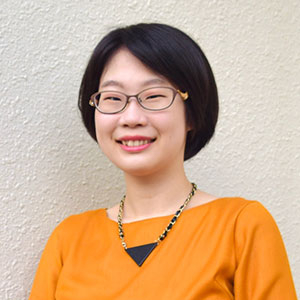
Ayako Tsuchiyama
First-year doctoral student at the Department of Earth, Atmospheric and Planetary Sciences, Massachusetts Institute of Technology
March 2021: Completed a master's degree program at the Department of Earth and Planetary Sciences, School of Science, Tokyo Tech
2020 academic year: GSEC Advanced Completion
I started aiming to become a scientist in the summer of my second year of junior high school. I participated in a science camp for 8 nights and 9 days, where I was impressed by daily lectures from prominent scientists and astronauts. I began to think that I would like to one day become an internationally active scientist and that I would eventually need English proficiency for that purpose.
Immediately after enrolling at Tokyo Tech in 2015, I joined GSEC, where I made extensive use of e-learning. I was able to use the app for free, and when I reached the upper ranks for study time, I was able to take the TOEFL iBT test once for free. So, I kept using it as if I were playing a game.
I also studied abroad multiple times. During the spring holidays at the end of the first year of my bachelor's degree program, I participated in a program of the Okinawa Institute of Science and Technology Graduate University (OIST), which is very international. There, I realized that my English level was low. I felt frustrated watching participants giving fluent presentations in English without even looking at a script.
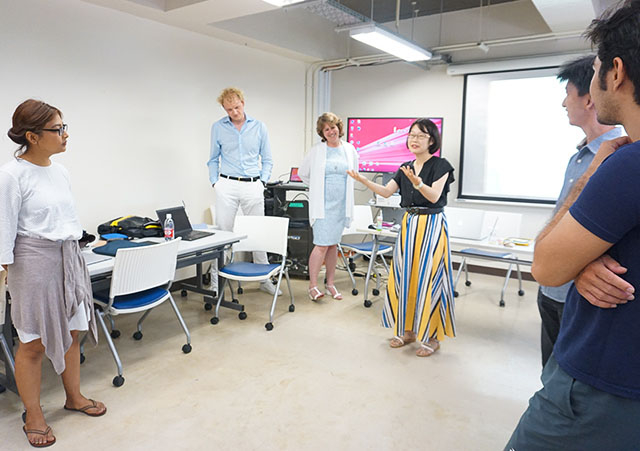
Class by Professor Stacey Doremus at Tokyo Tech (Global Leadership Practice)
After that, I went to study abroad in India, Southeast Asia, and the United States for a short time. The purpose was to get used to English and improve my communication skills. In the third year of my bachelor's degree program, I participated in the Georgia Institute of Technology Leadership Program on a short-term study abroad. A teacher I met there came to Japan in June of the same year for Global Leadership Practice course, and under her leadership, we did group work with international students from all over the world. That experience helped me to get a feel for the American classroom atmosphere. The lesson style of working together with the faculty through discussions is very different from the lecture-type lessons in Japan, and it also inspired me to study at an American university.
As a fourth-year bachelor's degree student, I had a great experience being sent to the "Stockholm International Youth Science Seminar" as a representative of Japan in December 2018. This program is held in conjunction with the Nobel Prize events, and is a program in which 25 young scientists selected from all over the world present their research and interact with each other. Here, too, I witnessed people around my age fluently speaking in English about their specialization, which renewed my desire to be a scientist who can convey the fun of science to everyone on the world stage.
In the second half of the program, I participated in events such as the Nobel Prize award ceremony and interacted with prominent scientists. It was a dream week, with interactions with colleagues who aspire to one day be scientists and interviews with Nobel laureates. By having such an opportunity, I was able to enjoy the event itself, but I felt that my English level was still insufficient to stand on the same stage as them and play an active role in the world. I wanted to keep studying English.
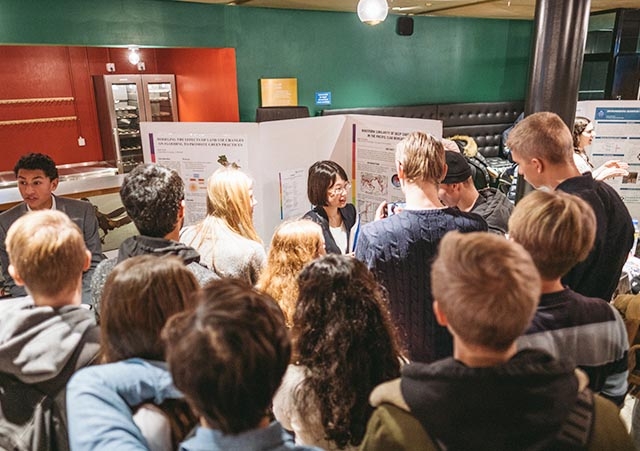
Stockholm International Youth Science Seminar and Poster Presentation (provided by the Japan Prize Foundation)
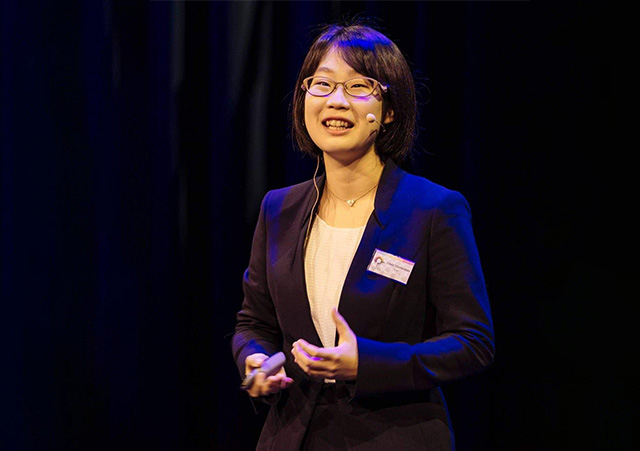
Presentation at the Stockholm International Youth Science Seminar (provided by the Japan Prize Foundation)
As I proceeded to a master's degree program and my research progressed, I had a stronger desire to have my own specialization, debate with people from all over the world, and contribute to scientific progress. I was fascinated by American graduate schools with students from all over the world, and after completing my master's degree program at Tokyo Tech in March 2021, I proceeded to a doctoral degree program at the Massachusetts Institute of Technology (MIT) in September of the same year.
I would like all university students who are going to acquire a specialization to envision the future of their studies as they engage in learning. Since English is a communication tool, I think that studying English after thinking about what you want to do in the future will keep you motivated for a long time. If you have even a little desire to study abroad, I would encourage it. Even if you can't currently conjure up a concrete vision of the future, studying abroad may help you find new goals.
To increase your English proficiency, it is effective to study by combining English courses, self-study, and certification exams.
In addition to required English courses, you can acquire the necessary skills by taking electives such as "Academic Presentation" and "TOEFL Seminar," based on your goals.
Doing self-study by e-learning in parallel with taking courses will lead to improved English proficiency through synergistic effects.
* About e-learning support
GGSEC supports about 250 people doing e-learning for free twice a year through open enrollment. If there is a large number of applications, priority will be given to students who belong to GSEC and who are progressing through their courses.
The teaching materials used are "EnglishCentral" and "Study Sapuri English." One focuses on improving the four basic skills and strengthening your speaking ability through conversation lessons with foreign instructors, and the other is tailored to TOEIC.
You can check the results of your studies by taking various tests such as TOEIC® L&R, TOEFL®, and IELTS™, depending on your goals. In the first and third years of a bachelor's degree program, everyone will take the TOEFL ITP.
A certification exam allows you to check your own abilities and motivates you to study further. To study abroad, a certified test score is often necessary, so it is recommended that you start taking the test at an early stage and aim to obtain the target score.
Credits are the number of educational units earned for elective English language courses.
The numbers in parentheses are the numbers of people who obtained the scores.
If you are using e-learning well, as a perk you can get exam fee support for TOEFL iBT and IELTS which are required for studying abroad. You can use the certification test support at any time you like.
In addition, by taking advantage of the opportunities for international exchange provided by Tokyo Tech and actually using English, you can aim to acquire practical English proficiency.
Tokyo Tech's support for improving English proficiency is designed from the perspective of acquiring global competence while developing science and engineering expertise. GSEC is the embodiment of that purpose. This course consists of basic and intermediate levels for bachelor's and master's degree students and an advanced level for master's degree students who have completed the intermediate level.
There are four programs for GSEC basic and intermediate levels, and the main focus of the "English and Communication Program" is improving English proficiency. In this program, GSEC students will take courses to acquire practical English proficiency.
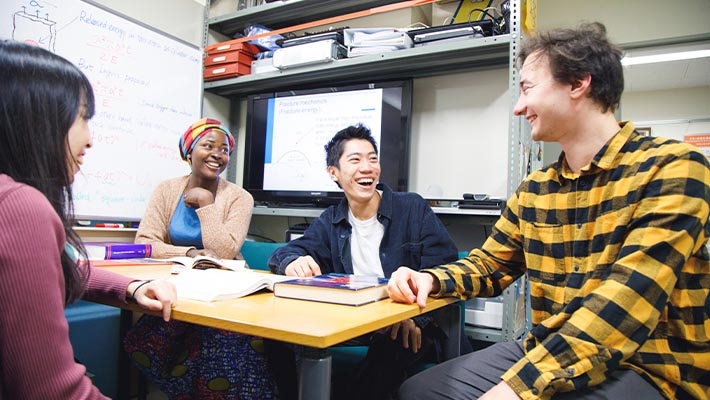
Interaction with international students at the lab
There are various purposes for studying English depending on the student, such as communicating in English, studying abroad, submitting a research paper in English, and presenting at an international conference. You can choose the course that suits your goals and abilities.
If you wish to study abroad, no matter how good your grades are in your field of specialization, you will need a score of TOEFL or equivalent specified by your desired university. Therefore, this course also focuses on supporting English e-learning and scoring high on an English exam.
It is necessary to improve your English ability in all four skills; listening and reading, and writing and speaking. In particular, Tokyo Tech students should make efforts to enhance the latter. In addition to taking courses, we also offer opportunities for international collaborative learning, such as exchange with the Georgia Institute of Technology, Chulalongkorn University and the Massachusetts Institute of Technology (MIT) as an opportunity to learn English by immersing yourself in the country and culture. You should actively participate in this exchange.
Neither English scores nor communication skills can improve drastically in a few months. Accumulation of daily efforts is important. If you consistently study English when you are a student, you will gradually get used to it and become more confident using it, even if you cannot communicate well in English at first. Students who wish to study abroad while still at the Institute should start learning English early. For example, if you wish to take part in an International Exchange Program, you can apply about half a year to a year in advance, but at that time your TOEFL score must meet the requirements. In addition, submitting documents at an early recruitment session will increase your chances of receiving a scholarship. It's still not too late. I would like to reiterate that it is essential for you to start studying English and to keep going.
The Special Topics component of the Tokyo Tech Website shines a spotlight on recent developments in research and education, achievements of its community members, and special events and news from the Institute.
Past features can be viewed in the Special Topics Gallery.
Published: June 2022